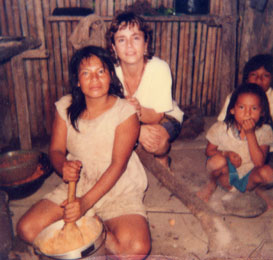 |
|

Celf Specialization: Medical Anthropology
As a part of the CELF project I explore how, among middle-class working families in Los Angeles, lay health beliefs are constructed and enacted in everyday practices and interactions. I focus on the household production of health, within the home, as an essential unit of analysis, investigating how, in the course of daily life, men and women perceive and act upon “health” and health related concerns. At first, I focus on what constitutes “quality of life” for families; their goals and expectations, to investigate the meaning of health and well-being, and how health-relevant decisions and behaviors can be understood as an integral part of the everyday fabric of family interaction. I aim to understand the ways in which evaluations of physical health today are linked to moral judgments about personal worth, with special attention to the inter-relationship between perceptions of food and health across these families. Then, I closely examine how illness affects everyday routine activities, and how, the interruption of social and economic routines of families correlate with treatment actions, family stress and personal evaluations of life satisfaction. Ultimately this research seeks to understand the manifold ways in which families seek actively to promote health, prevent and treat illnesses. Combining multiple research methodologies, through analysis of health interviews, illness narratives, and video-taping in the home, theories of health seeking behavior, which integrate individual and social, emotional and behavioral levels of functioning, will also be derived. Preliminary findings indicate that parents speak of their families’ health as a complex process of negotiation between individual desires and ideals, very much constrained by work, and influences outside the control of the home (like formal schooling and the media advertising). Health ideologies reflect and affect moralities about what is acceptable behavior. These ideologies are not static, but ever changing, affected by such global experiences as the political environment and world circumstances. Parents employ metaphors of “fixing” their health, and, “modeling” good health for their children; yet, observations of their daily activities illustrate the difficulties they face in the promises they make as they enact their health ideas in everyday life.
| |
